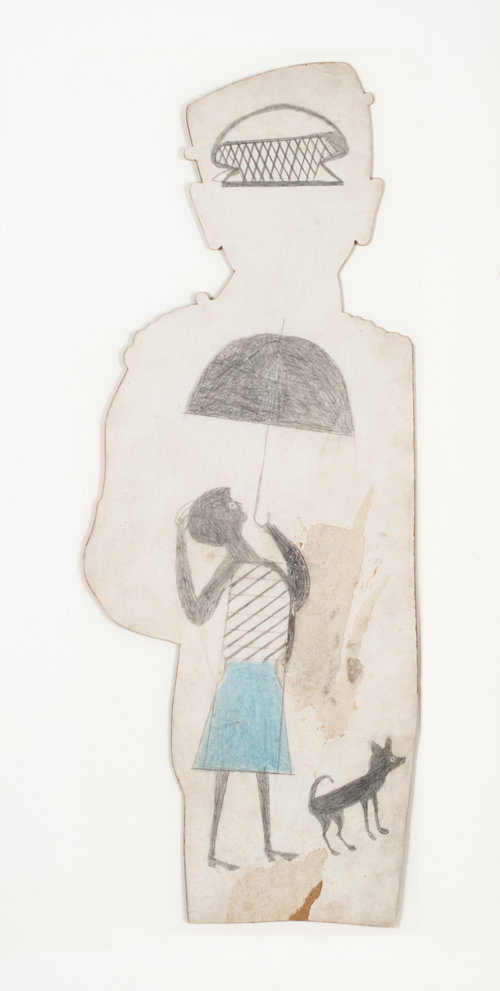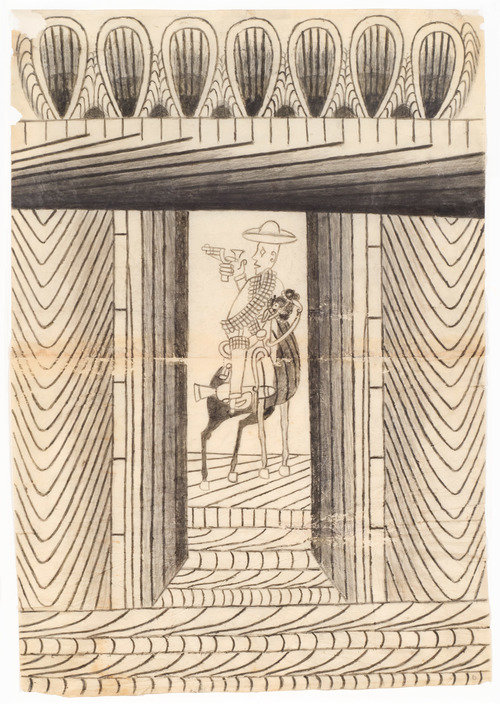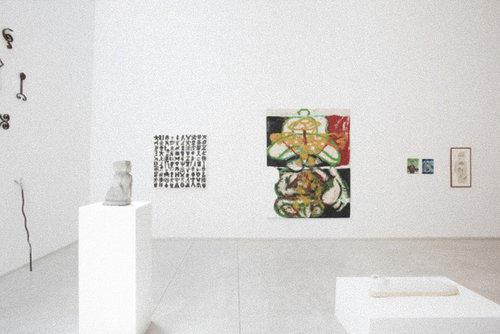Bill Traylor was born into slavery in 1854 on the plantation of George Hartwell Traylor, near Benton, Alabama. He received no formal education, and after his emancipation he chose to remain on the Traylor family's land as a farmhand with his wife and twenty-two children. He lived there until 1938, when he was eighty-four. Then, after his wife and the Traylors had passed away, and his children had left, he moved to Montgomery, Alabama. He worked in a shoe factory until rheumatism effectively disabled him, allowing him to collect financial support from the government. Homeless and unable to work, Traylor spent nights in the storage room of a funeral parlor and days in a chair on the sidewalk in front of a pool hall or under a shed roof in Montgomery’s downtown street market.
It was not until 1939, when Traylor was eighty-five, that he began to draw. “It just come to me,” he told a reporter. A master of line, he delineated geometric forms using a pencil and a straight-edge, filling them in with colored poster paint provided by Charles Shannon, a local artist, friend, and champion of his work. Traylor drew on whatever material (often shirt cardboard) he could find, incorporating any distortions or attributes of the surface into his compositions. Between 1939 and 1942, he produced approximately 1500 works, many of which now reside in major private and public collections, including the American Folk Art Museum and the Museum of Modern Art, both in New York. In 1942, World War II forced him to travel north to live with his children in Washington, D.C. and Detroit. Four years later, at the end of the war, Traylor returned to Montgomery and began to draw again. He died the following year, while living in a nursing home.
Traylor’s work was shown twice in his lifetime: in 1940, at New South, an art center in Montgomery, and in 1941, at the Fieldston School in New York. It was not until 1979, almost thirty years later, that Traylor’s work was exhibited again, this time at the R.H. Oosterom Gallery, New York. Traylor was included in the 1982 Black Folk Art in America exhibition at the Corcoran Gallery, Washington, D.C., which was the first major exhibition of its kind. Much of Traylor’s work — often humorous, formally sophisticated, and event-based — follows a narrative depicting discretely powerful elements of the African-American experience in the rural South. Shadowy specters in the form of silhouetted figures drink and scamper with animals, and the artist imbues the humble cardboard surface with a sense of both playfulness and dread. Despite the flatness of the image and the non-perspectival devices employed to create an illusion of depth, the dynamic action and sense of space are utterly convincing. Within the last decade, Bill Traylor’s legacy has been evaluated as one of the most significant in twentieth-century American self-taught art.
Press for Talisman in the Age of Difference at Stephen Friedman Gallery
UK artist Yinka Shonibare brings African and diaspora artists to London
—The Art Newspaper

National Gallery of Art
Washington, DC
Jan 28–May 13, 2018
Curated by Lynne Cooke, and including Eugene Von Bruenchenhein, James Castle, Howard Finster, Sister Gertrude Morgan, Gladys Nilsson, Jim Nutt, Elijah Pierce, Horace Pippin, Christina Ramber, Martín Ramírez, Edgar Tolson, Bill Trayor, P.M. Wentworth, H.C. Westermann, Joseph Yoakum, Forrest Bess, Roger Brown, William Edmondson, Lee Godie, Morris Hirshfield, among others.

Billy and Steven Dufala, William Edmondson, and Bill Traylor are included in "A Being in The World" at Salon 94 Bowery, curated by Jayson Musson and Fabienne Stephan.
A Being in The World
June 29, 2016–July 29, 2016
Salon 94 Bowery

Philadelphia Museum of Art
Philadelphia, PA
Mar 3–Jun 9, 2013
Group show featuring James Castle, Bill Traylor, Eddie Arning, William Hawkins, Eugene Von Bruenchenhein, Joseph Yoakum, et. al.